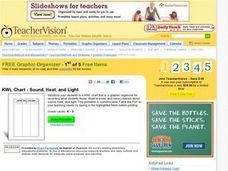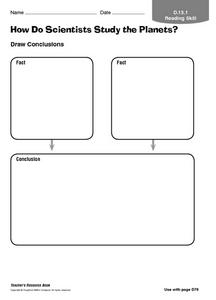Polk Bros Foundation
I Can Draw Conclusions: History Analysis
This worksheet outlines the very basic first steps to analyzing a historical topic and determining its significance. The resource prompts learners to identify important persons in history, list major events, and evaluate cause and effect.
Polk Bros Foundation
I Can Identify/Infer Motive
Why do people and characters act as they do? Require your class figure out the motivation of two people or characters they read about in a given text. In the short charts, pupils note down who, what they do, and why they do it. After...
Frederick Moleski, Ph.D.
Blood Spatter: Bloodstain Analysis Experiments
It may be gruesome but somebody's got to do it! Young forensic scientists get a feel for what the job entails as they study blood spatter in seven experimental activites. They examine how spatter can be changed by release height,...
Houghton Mifflin Harcourt
Family and Friends: Extra Support Lessons (Theme 4)
Family and Friends is the theme of a unit offering extra support lessons. Follow each lesson plan's teach, blend, guided practice or practice/apply routine to reinforce concepts such as clusters, responding to reading, drawing...
Curated OER
Muestra que occurió
Pair this graphic organizer with any sort of text. It could be used with fiction or nonfiction texts. As they read, Spanish pupils record the who, what, when, where, and why.
School District of Palm Beach County
Framed Paragraphs characterization, problem and solution, symbolism, conflict
Support your learners as they work on writing paragraphs by providing graphic organizers, outlines, and frames. Sift through this packet to find the perfect organizers and templates to prepare pupils for writing. The resource...
Scholastic
Follow the Clues
Invite your text detectives to bring their magnifying glasses to school to examine the clues in a text and make predictions. They write down three clues and a prediction on the graphic organizer.
Curated OER
Chain Letters and Pyramid Schemes
In this statistics lesson, learners analyze chain letters and draw conclusions of the outrageous amount of letters that would be mailed out if people really followed through. This is more of a thought provoking instructional activity...
Curated OER
Is It A Bird?
In this bird characteristics worksheet, students compare the characteristics of bats and penguins to those of birds, then draw conclusions about whether bats/penguins are birds. General characteristics of birds are given in the first...
Midland Independent School District
Drama
Ten drama lessons are the perfect addition to your language arts or theater class. With a focus on script elements, plot development, and parts of a dramatic story, the lessons guide young playwrights through the steps of telling a story...
Sunburst Visual Media
Clouds
Support science instruction with a combination of engaging activities and skills-based worksheets that focus on clouds. Learners take part in grand discussions, write an acrostic poem, complete graphic organizers, solve word...
Curated OER
Making Inferences
Here is an excellent graphic organizer that learners use to write details and facts in boxes to the left, and inferences about them on the right. A good worksheet for visual learners!
Curated OER
Steps of the Scientific Method
This graphic organizer would be quite handy for making an overhead transparency and posting it for learners to view while doing any kind of sceince inquiry/experiment. This is a tried-and-true method, and is very important for any...
Curated OER
Monster: Compare and Contrast
Helpful for a unit on Walter Dean Myers' Monster, or any novel that you are teaching, a graphic organizer prompts learners to compare and contrast different character traits. The first box has one set of lines to jot down what two...
Curated OER
Sound, Heat, and Light
In this sound, heat, and light worksheet, students fill in a KWL chart for what they know, what they want to know, and what they learned about sound, heat, and light. Students complete 3 sections in the graphic organizer.
Curated OER
How Do People Use Their Parts?
In this senses worksheet, students complete a graphic organizer by describing what a person uses its hands, eyes, mouth, ears, and nose to do.
Curated OER
How Do Scientists Study the Planets?
In this planets worksheet, students brainstorm 2 facts about how scientists study the planets. Then students will come to a conclusion based on their facts. This worksheet is a graphic organizer.
Other popular searches
- Nonfiction Draw Conclusions
- Draw Conclusions in Reading
- Draw Conclusions Lesson
- Draw Conclusions Reading
- How to Draw Conclusions
- Infer and Draw Conclusions
- Draw Conclusions in Literacy
- Draw Conclusions in Fiction
- Fiction Draw Conclusions
- Draw Conclusions Worksheet
















